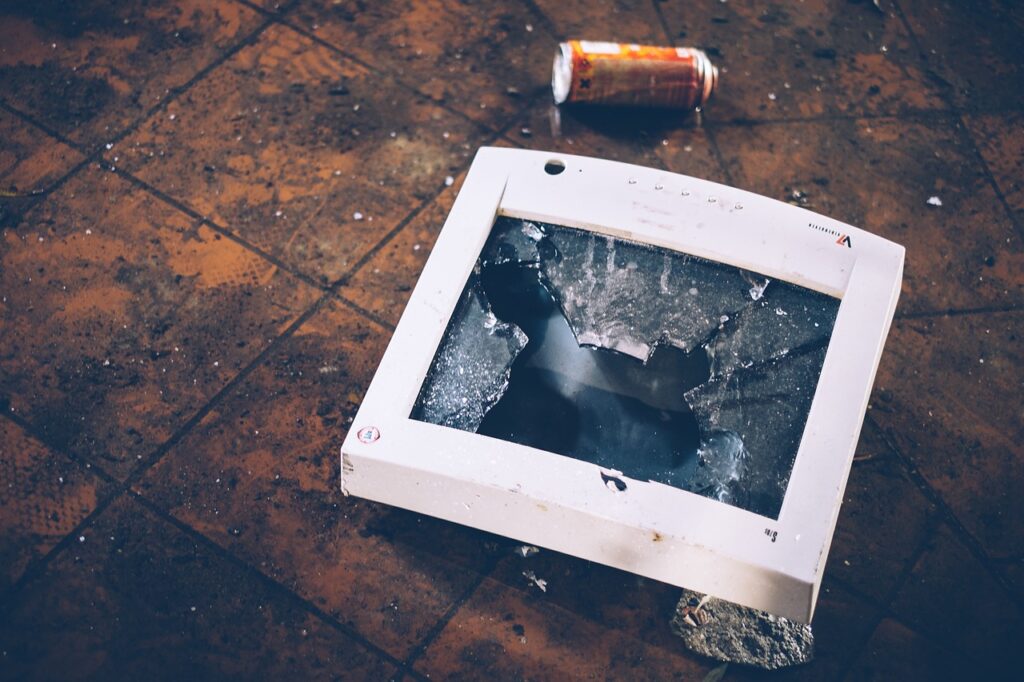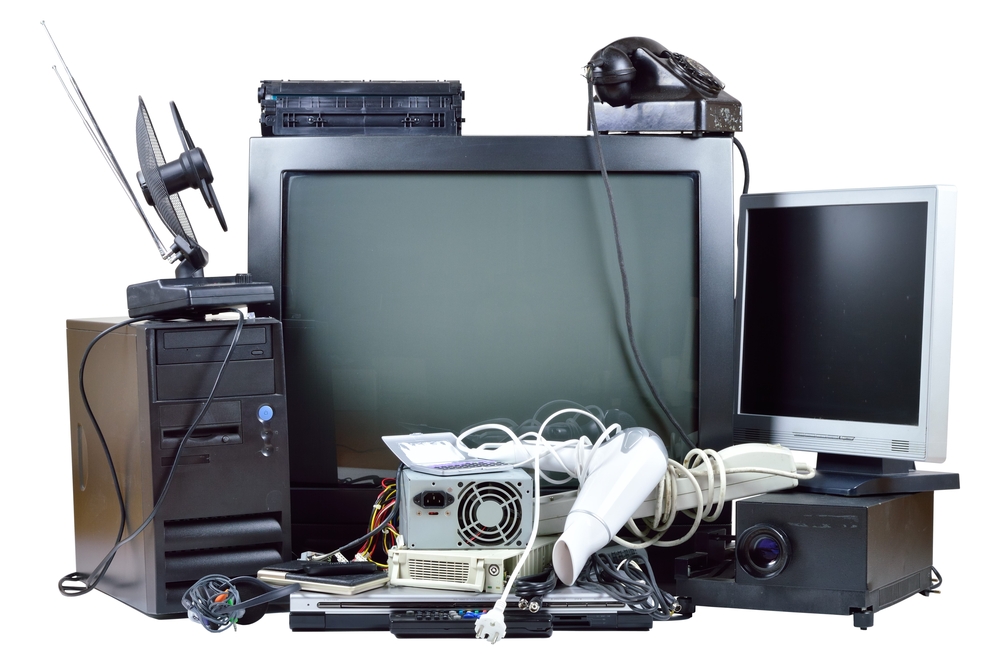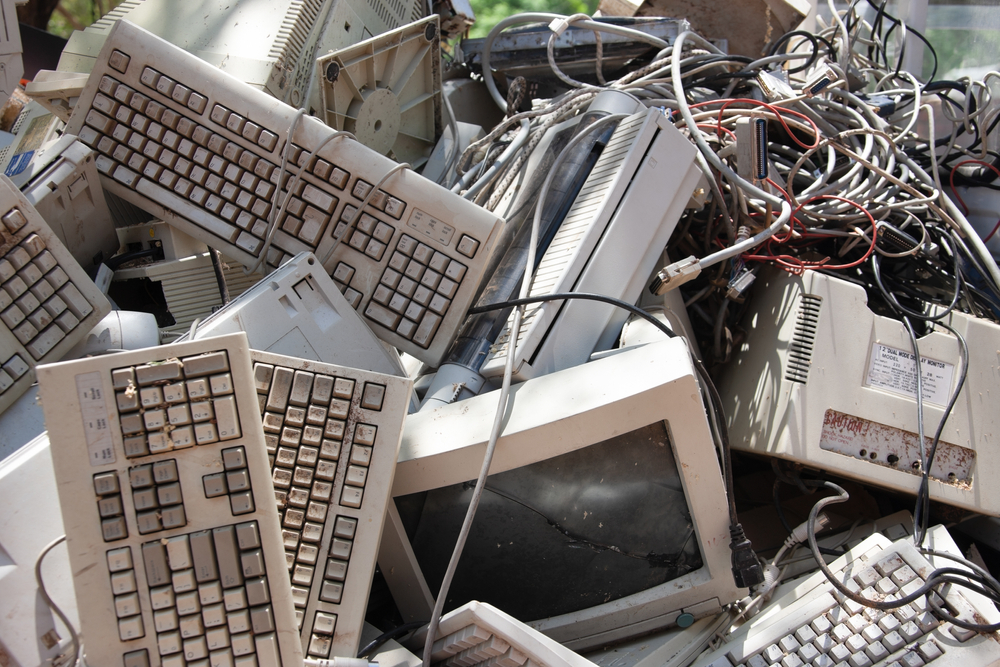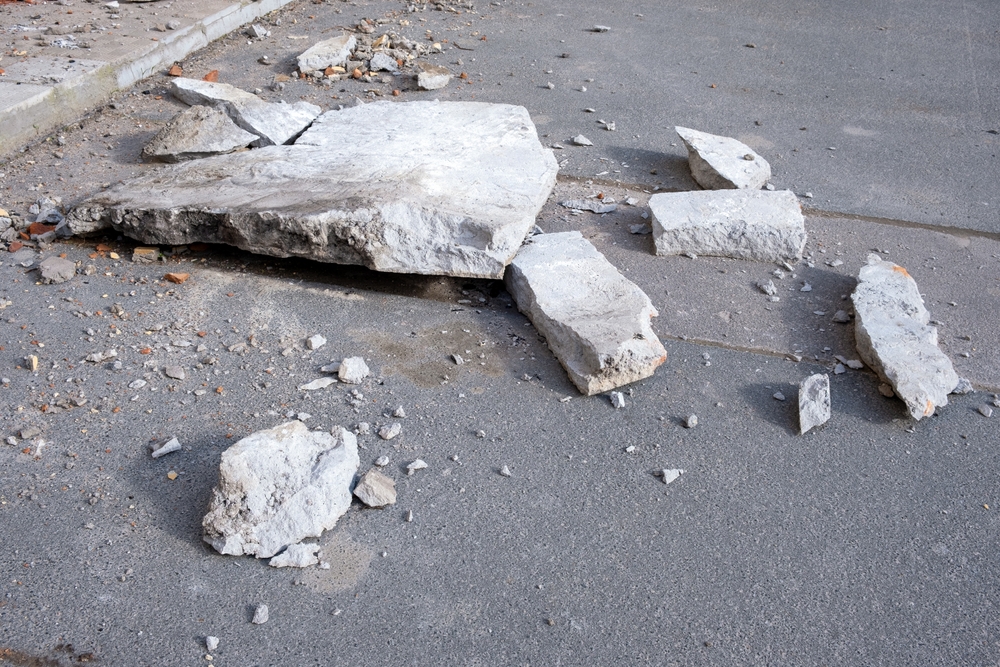February 7, 2024 - Benjamin Ehinger
How to Get Rid of Old Computers: Safe & Eco-Friendly Methods
CALL NOW 844-762-8449
Disposing of old computers is a task that many of us will face at some point. As technology rapidly advances, equipment that was once cutting-edge can quickly become obsolete. Beyond just taking up space, outdated computers can be a source of confidential data, making it important to handle them carefully. When you’re ready to clear out old electronics, consider options such as a small dumpster rental, which offers a convenient way to dispose of multiple items at once.
While it can be tempting to simply toss out old computers, you need to be aware of the environmental implications and your personal data security. Computers contain harmful substances that can adversely affect the environment, so it’s crucial to find a responsible way to dispose of them. Moreover, your old computer is likely to have sensitive information stored on its hard drive, from passwords to personal emails, so ensuring this data is properly erased or destroyed before disposal is paramount.
 When disposing of your old computers, it’s important to do so in a way that’s safe for the environment. Responsible disposal means considering the toxins and valuable materials inside electronic devices.
When disposing of your old computers, it’s important to do so in a way that’s safe for the environment. Responsible disposal means considering the toxins and valuable materials inside electronic devices.
 When your computer seems past its prime, you have options that can extend its life through repurposing. With a little creativity, obsolete computers can still serve useful functions.
Convert to a Media Center:
When your computer seems past its prime, you have options that can extend its life through repurposing. With a little creativity, obsolete computers can still serve useful functions.
Convert to a Media Center:
Key Takeaways
- A small dumpster rental can be an effective method to dispose of multiple old computers.
- Ensuring the secure erasure of personal data is essential when getting rid of old computers.
- Environmental considerations should guide the disposal process to minimize harmful impacts.
Understanding Data Security
When preparing to dispose of old computers, understanding how to manage your data securely is crucial. Your action plan should start with recognizing the level of sensitivity of your data and knowing your options for its complete destruction.Determining Data Sensitivity
Assess your files: Start by categorizing the data on your old computer. Look for personal information such as financial records, social security numbers, or business-related documents. These types of information are highly sensitive and require careful handling.Options for Data Destruction
- Physical Destruction: This method involves destroying the physical components of a hard drive so that data recovery is impossible. Employing services that offer data devices safety can ensure that your hard drive is shredded, crushed, or otherwise physically obliterated.
- Data Wiping Software: Utilize software designed to overwrite your sensitive data with random information. This ensures that the original data cannot be retrieved. These programs can perform the wipe repeatedly to meet security standards, as explained in How to Protect Your Data When Recycling a Computer.
Preparing Computers for Disposal
When disposing of your old computer, it’s crucial to protect your personal data and comply with software licenses. The following steps ensure that your digital life remains private and you remain in good legal standing.Backing Up Important Data
Before disposing of your computer, back up any important files, as you won’t be able to retrieve them once the device is gone. Consider using an external hard drive or a cloud-based service to securely save your documents, photos, and other significant data.Deauthorizing Software and Services
Make sure to deauthorize any software that is limited to a certain number of devices. This includes music and video apps, as well as personal software licenses. By deauthorizing your computer from these services, you’ll avoid future access issues and maintain your subscription integrity.Environmentally Responsible Disposal
 When disposing of your old computers, it’s important to do so in a way that’s safe for the environment. Responsible disposal means considering the toxins and valuable materials inside electronic devices.
When disposing of your old computers, it’s important to do so in a way that’s safe for the environment. Responsible disposal means considering the toxins and valuable materials inside electronic devices.
Local Electronics Recycling Programs
Your community likely has established local electronics recycling programs where you can bring your old computers and other electronic waste. These programs are designed to handle the toxic materials in electronics such as lead, cadmium, and mercury, and recover valuable materials like metals and plastics for reuse. How to find local programs:- Check your local waste management website
- Look for community e-waste collection events
- Contact local electronics retailers, as they often have information on recycling programs
Manufacturer Take-Back Programs
Many electronics manufacturers offer take-back programs, where they take back their products for recycling at the end of the product’s useful life. By using these programs, you help ensure that your old computers are disposed of in a manner consistent with the company’s commitment to sustainability. What to do:- Identify the manufacturer of your equipment
- Visit their website or contact customer service for disposal instructions
- Follow their guidelines to send back your old computers for recycling
Donating to Extend Lifecycle
Donating your old computer is an environmentally responsible choice that can also benefit others. By offering your device for reuse, you ensure it serves a purpose beyond its initial lifespan.Criteria for Donatable Computers
When considering donation, assess your computer’s condition to ensure it’s suitable for reuse. Recipients typically seek computers that:- Are less than 5 years old
- Have a working operating system or no software issues
- Include essential components like a monitor, keyboard, and mouse
- Do not possess any physical damage that impacts functionality
Identifying Appropriate Recipients
To find a new home for your computer, look for community programs, educational institutions, and nonprofit organizations. Some organizations that accept and provide guidelines for donating electronics include:- Electronics Donation and Recycling | US EPA
- How To Donate Your Old Computer To An Electronic Recycling Center
- How to Recycle Old Electronics – Consumer Reports
Selling Old Computers
Before you decide to sell your old computer, it’s important to prepare the device to maximize its value and select the right sales platforms to reach potential buyers.Preparing Computers for Sale
- Back Up Your Data: Ensure all personal data is backed up on an external drive or cloud storage.
- Wipe Your Hard Drive: Perform a factory reset or use software to completely erase the hard drive to prevent data theft.
- Clean Your Computer: Dust off the keyboard, clean the screen, and wipe down the casing to improve its appearance.
- Gather Accessories: Include necessary cables, chargers, and manuals to increase the perceived value.
- Repair Minor Issues: Fixing small defects may be worthwhile to attract more buyers.
Choosing Sales Platforms
- Online Marketplaces: Sites like eBay or Craigslist can reach a wide audience. List your computer with clear, high-quality photos and a detailed description of its condition and specs.
- Social Media Marketplaces: Facebook Marketplace and groups are good for reaching local buyers.
- Trade-In Programs: Retailers like Best Buy or manufacturers may offer trade-in programs where you can exchange your old device for credit towards a new purchase.
- Specialized Electronics Platforms: Websites that focus on electronics might attract more knowledgeable buyers who are willing to pay a fair price for your old computer.
Repurposing Obsolete Computers
 When your computer seems past its prime, you have options that can extend its life through repurposing. With a little creativity, obsolete computers can still serve useful functions.
Convert to a Media Center:
When your computer seems past its prime, you have options that can extend its life through repurposing. With a little creativity, obsolete computers can still serve useful functions.
Convert to a Media Center:
- Storage: Utilize the hard drive to store movies, music, and photos.
- Playback: Use software like Kodi or Plex to manage and play your media.
- Data Hub: Store files for easy sharing between home devices.
- Services: Host your own website or a Minecraft server for personal use.
- Education: Schools may accept older computers for teaching basic computer skills.
- Charity: Some nonprofits refurbish and distribute computers to those in need.
- Components: Salvage parts such as RAM and hard drives for other projects.
- Learning Tool: Practice upgrading or repairing computers without the risk.
- Single-Use: Set up for tasks like word processing or data entry.
- Education: Ideal for children learning to type or use educational software.
Data Destruction Certificates and Records
When you dispose of your old computers, obtaining data destruction certificates is critical. These documents provide proof that your sensitive data has been securely and irreversibly destroyed.Maintaining Disposal Documentation
To protect yourself and your business, it’s imperative that you maintain accurate documentation of your computer disposal processes. An official data destruction certificate should accompany any service you use. This certificate is crucial for your records as it:- Ensures compliance with data protection laws.
- Verifies the destruction method used aligns with industry standards.
Local Legislation and Compliance
When disposing of your old computers, it’s essential to adhere to local laws governing electronics recycling. These regulations are not uniform across the board; they vary by state and can affect both residents and businesses. For example, the Consumer Electronics Recycling Act in Illinois mandates a statewide recycling system for specific electronic devices. Key Points to Remember:- Find Your State’s Legislation: Most states have specific e-waste disposal laws. Begin by searching your state government’s environment or waste management website.
- Manufacturer Takeback Programs: Some states require manufacturers to take back electronics for recycling. Check if the manufacturer of your device offers this service.
- Ensure compliance with state regulations.
- Verify that your electronics recycler is registered with the state agency, as pointed out in Illinois (Illinois Environmental Protection Agency).
- Research Local Laws: Quick web searches for “electronics recycling laws [your state]” can provide the needed information.
- Use Certified Recyclers: Look for facilities that comply with local and federal regulations to avoid improper disposal that could harm the environment.
- Data Security: Before recycling, secure your personal information by wiping your computer’s data.
Frequently Asked Questions
What are the options for free computer disposal in my vicinity?
You can often find local electronics stores or recycling centers that offer free computer disposal services. Many charities accept functional electronics, giving your old computer a second life.Where can I recycle computers for monetary compensation?
Some recycling programs offer monetary compensation for electronic components due to the valuable materials they contain. Check with local e-waste recycling facilities; they sometimes buy back certain models or parts.How can I ensure safe disposal of an old computer tower?
For a safe disposal, remove any batteries and consider using a certified electronics recycler. These recyclers follow standards to protect your data and the environment.What steps should be taken before recycling a personal computer to protect personal information?
Before recycling your computer, it’s vital to back up data, perform a factory reset, and use software to permanently erase the hard drive. This ensures your personal information won’t be recoverable.Does Best Buy offer services for disposing of old computers?
Yes, Best Buy has a recycling program which typically accepts old computers. Confirm with your local store’s guidelines, as their policies may vary.Is it necessary to remove the hard drive from a computer prior to recycling it?
It is highly recommended to remove and destroy the hard drive before recycling. This step guarantees the protection of your sensitive data. If you choose not to remove it, ensure you’ve effectively wiped the data clean.RECENT BLOGS
Our Reviews
Glenda Lanier Prowell
1721758635
I have ordered an 11 yard dumpster to be delivered to my house.Lonier was extremely helpful and answered all my questions. The rate was very reasonable.
Cedric Smikle
1721660395
Amber was extremely professional and courteous. She answered all of my questions and even some that I didn’t know I needed to ask.
Cait Kaider
1721243051
I highly recommend Waste Removal USA for their responsiveness and how the staff work hard to provide exceptional customer service. They have done well by us and our clients. Thank you!
Easom Family
1721223306
Louiner Pierre-Louis Is awesome! Did a great job. Will definitely be using this same company for all my dumpster needs because of his awesome customer service! Thank you!!!
tabitha Vazquez
1720539988
Wonderful and fast customer service!
LATEST BLOGS






